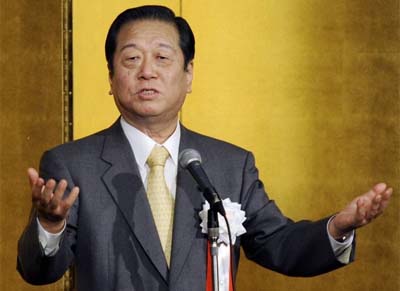The DPJ executive handed out the suspension in February because of Ozawa’s mandatory indictment for an alleged violation of the Political Funds Control Law.
The suspension means Ozawa cannot attend formal party functions, cannot stand for party president or vote in the party presidential election, and could face the next general election without the DPJ’s endorsement and financial backing.
Kan’s personal hostility towards Ozawa is also palpable, having indicated that Ozawa should consider resigning from the DPJ and Diet. At the New Year’s Day party at the Kantei, Kan said Ozawa ‘will soon be forcibly indicted, so his political activities will become extremely limited. Politically, he is gradually vanishing… I recently read former Prime Minister Hosokawa and Kaifu’s books. What they both had in common as prime ministers was that their administrations were led astray and eventually collapsed and became completely mutilated as a result of Ozawa’s manipulation. In the end, they were both disgusted and held a grudge against Ozawa… I won’t make the same mistake.’ [Bungei Shunjū, February issue].
Given Ozawa’s obvious discontent with the political status quo, why has Ozawa not led his followers out of the DPJ and formed a new party, thus precipitating a new round of party realignment? This would reprise the role he played in 1993 when he made his first major break from an established party, guiding a group of supporters out of the LDP, then joining with the opposition parties in a vote of no confidence in the Miyazawa government, which subsequently fell.
The reason is, in 2011, Ozawa is dealing with an entirely different political environment. As he has calculated, such a move is likely to be a journey into the political wilderness. When Ozawa left the LDP he used electoral reform as the clarion call to rally not only his own supporters but also the electorate, a new party and a new coalition government. There is nothing equivalent at the present time.
There are also no parties or elements within other parties that would seriously consider joining with an Ozawa breakaway group. Linking up with his old party, the LDP, is hardly a credible option given the aversion of many of its members, leaders and former leaders to Ozawa personally, although there were rumours earlier this year of a possible realignment of political forces involving elements of the LDP and DPJ Diet members loyal to Ozawa.
Another factor is that the Lower House now has an electoral system that generates strong disincentives for candidates standing for minor parties, leaving few reasons to defect from the DPJ. If a new Ozawa political grouping aspires to be anything more than a minor party, it will have to put up candidates to run against the LDP and DPJ in most districts. This will be beyond even Ozawa’s much-vaunted personal financial and logistical resources.
Ozawa will also need a large number of Diet members to follow him out of the DPJ at a time when the number of his followers is declining. At present, Ozawa retains the fervent support of a core group of 20–30 acolytes — some even left the DPJ’s parliamentary caucus in a gesture of defiance against the Kan administration earlier this year. But this group mainly consists of first-term Lower House Diet members whom Ozawa recruited and funded to stand for proportional representation seats in the 2009 Lower House election. With one or two exceptions, second- to fourth-term Diet members of the Ozawa group are more circumspect in their parliamentary behaviour. This means Lower House politicians more inclined to leave with Ozawa are the most electorally vulnerable and unlikely to survive a Lower House election. He would be leading a party of the unelectable.
It would take a huge leap of faith in Ozawa’s leadership abilities and his future career trajectory for any Diet member contemplating leaving the DPJ to place the fate of their Diet seat in Ozawa’s hands. The entire Ozawa group recently voted for the extension of the Diet session under Prime Minister Kan for fear of a Lower House dissolution and general election.
Ozawa himself remains under a cloud of suspicion for as long as his trial is set to run and the verdict remains unknown. In the circumstances, the likelihood of an Ozawa party attracting much public support is low. In a recent poll, 89 per cent thought badly of the way Ozawa and his supporters acted in relation to the no-confidence vote in the Kan administration, and only 1.7 per cent viewed Ozawa as a possible replacement for Prime Minister Kan.
Ozawa remains in the DPJ not because of any particular attachment to the party, or because he really believes in the importance of consolidating a two-party system which he helped create, but because his own prospects outside the party are so meagre.
Ozawa has decided that his best course of action is to work hard to bring down the Kan administration and install another more congenial to his interests — one that does not exclude him from the centre of power. This strategy explains his threatened support of the recent no-confidence motion (averted only when Kan offered to resign) and his followers’ attempted sabotage of the government’s legislative program.
Everything Ozawa has done over the past nine months since losing the DPJ leadership election suggests Ozawa is planning a comeback in the DPJ: getting rid of Kan and his cabinet, and engineering a power structure within the party more amenable to his manipulation. For Ozawa, the closer Kan gets to resigning, the more incentive he has to stay in the DPJ. He sees his future in an acquittal at his trial and a possible run again for party leadership.
Aurelia George Mulgan is Professor of Politics, Australian Defence Force Academy at the University of New South Wales, Canberra.

